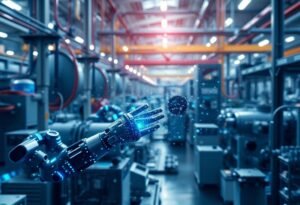The role of automation in manufacturing is pivotal for driving efficiency and fostering innovation. As businesses adapt to the evolving technological landscape, implementing automated processes becomes essential for maintaining competitiveness. In this article, we will explore how automation enhances productivity, reduces operational costs, and supports sustainable practices in the manufacturing sector.
The Impact of Automation on Manufacturing Efficiency
Automation in manufacturing significantly boosts operational efficiency. By replacing manual tasks with automated systems, companies can minimize human error and accelerate production rates. This transition leads to faster turnaround times and the ability to scale operations quickly. Leveraging technologies like robotics, manufacturers can streamline processes, enabling a more efficient workflow. The integration of automation allows for real-time monitoring, optimizing resource allocation and significantly reducing downtime.
Cost Reduction through Automation
One of the most compelling advantages of automation is the potential for cost savings. By automating routine tasks, businesses can lower labor costs while reallocating resources to more strategic initiatives. For instance, automated quality control systems can detect defects more efficiently than manual inspections, reducing waste and the costs associated with poor quality. This economic efficiency ensures manufacturers can remain competitive in a tight market.
Enhancing Product Quality with Automation
Automation not only increases production speed but also enhances the quality of manufactured goods. Consistency is crucial in product quality, and automated processes can ensure that every product meets the specified standards without variance. Advanced technologies, such as AI and machine learning, further enhance this by analyzing vast amounts of data to identify potential quality issues before they escalate, ensuring that only the best products reach the consumer.
Supporting Sustainability Initiatives
With growing concerns about environmental sustainability, automation plays a crucial role in helping manufacturers reduce their carbon footprint. Automated systems enhance energy efficiency by optimizing machine usage and minimizing waste. By implementing robotics in logistics and production, companies can reduce their energy consumption and utilize resources more responsibly. This commitment to sustainability not only meets regulatory requirements but resonates with environmentally conscious consumers.
Skills Development and Workforce Transformation
The shift towards automation requires a transformation in workforce skills. As routine tasks are automated, the demand for skilled workers who can operate and maintain these systems increases. Manufacturers must invest in training programs to equip their workforce with the necessary skills to thrive in an automated environment. This creates opportunities for employee growth and promotes a culture of continuous learning, essential in an innovative landscape.
The Future of Manufacturing with Automation
Looking ahead, the future of manufacturing is closely tied to advancements in automation. As technologies evolve, we expect to see even greater integration of artificial intelligence and machine learning in production lines. The smart factory concept will fully realize the benefits of automation, combining IoT, big data, and robotics to create highly efficient manufacturing systems. Remaining adaptive and open to new technologies will be crucial for manufacturers aiming to lead in this competitive sector.
Disclaimer: This article is for informational purposes only and does not constitute professional advice.





















